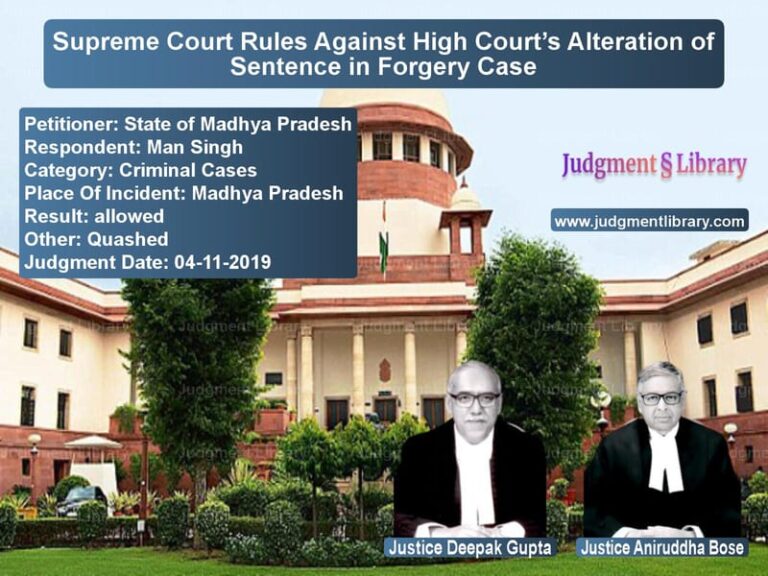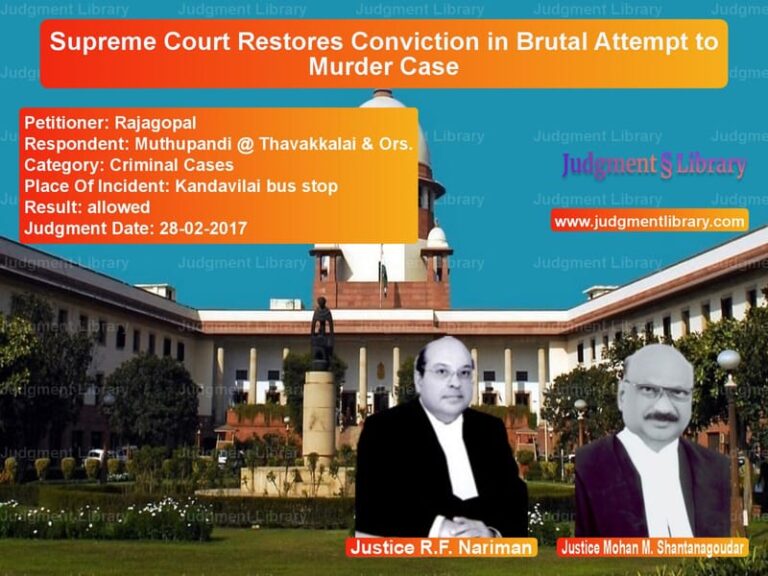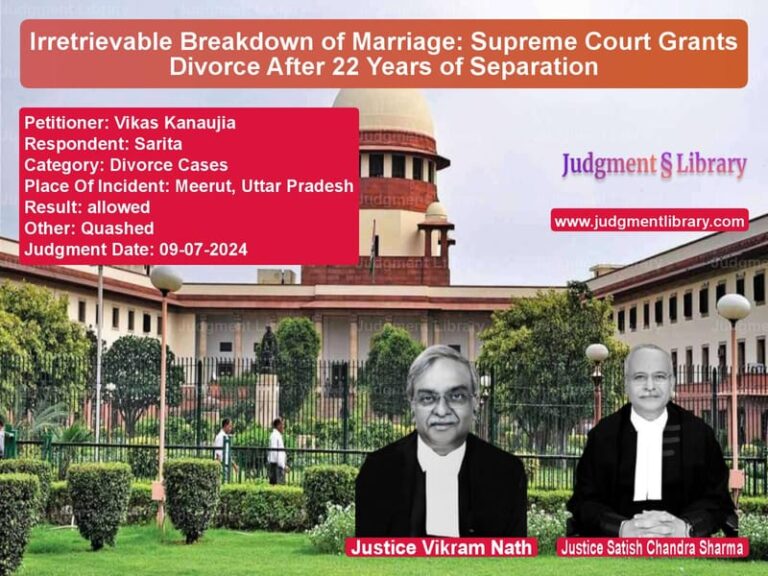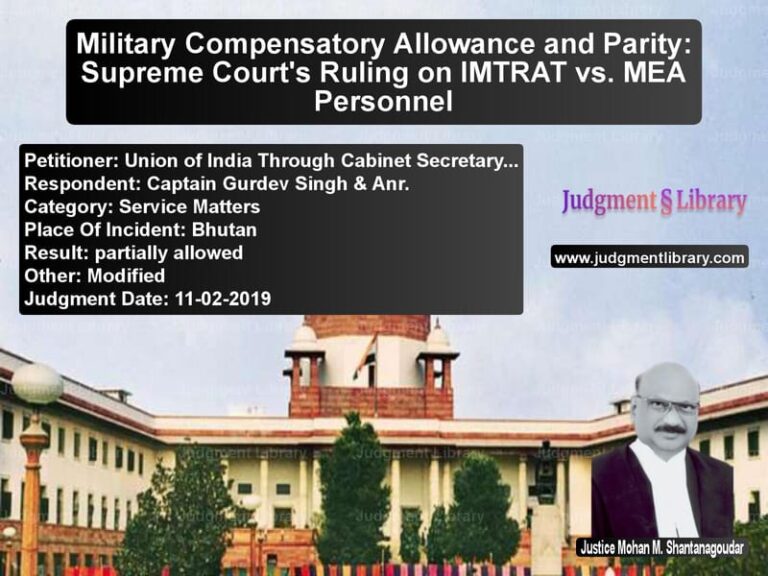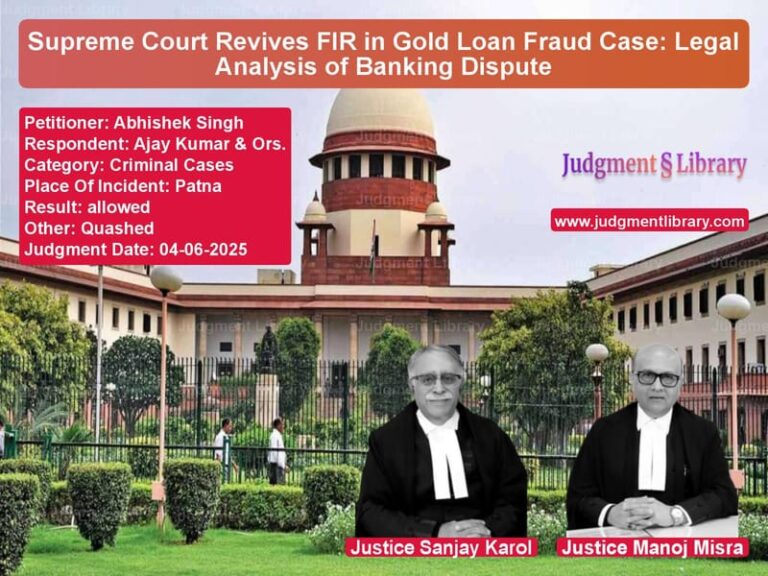Clarification on Tax Exemption for Charitable Trusts and Future Assessments
This judgment pertains to a Miscellaneous Application filed by the Assistant Commissioner of Income Tax (Exemptions), seeking clarification on the interpretation of Section 2(15) of the Income Tax Act, 1961, in relation to charitable trusts. The core issue revolved around whether the Revenue is permitted to redo assessments for the past years and examine eligibility for future years based on the court’s previous judgment regarding the tax-exempt status of various charitable organizations.
The Supreme Court had earlier delivered a judgment on 19th October 2022, considering the tax-exempt status of charitable organizations, including statutory and non-statutory bodies, sports organizations, and trade bodies. The issue of whether these bodies’ activities were aligned with the objectives of general public utility, as outlined under Section 2(15) of the Income Tax Act, was under consideration.
The Assistant Commissioner of Income Tax (Exemptions), represented by the revenue’s counsel, sought clarification on certain points in the judgment. Specifically, it was argued that the conclusions in Paragraph 253 and Paragraph 254 of the judgment restricted the Revenue’s ability to assess the concerned assessment years and prevented it from making future assessments regarding the eligibility of these organizations for tax exemptions. The Revenue’s application for clarification aimed at enabling a re-examination of past assessments and future cases based on the court’s interpretation.
The judgment in question, which was delivered after extensive deliberation on various charitable organizations and their activities, outlined detailed conclusions in Paragraph 253, where specific directions were given concerning the tax-exempt status of different types of organizations. Paragraph 253 includes findings related to the eligibility of organizations involved in activities such as trade, sports, and general public utility, and these findings were reflected in the operative directions in Paragraph 254 of the judgment.
The Revenue contended that Paragraphs 253 (H) and 254 precluded it from reviewing past assessments and would also prevent it from considering similar issues in future cases. Specifically, they sought clarification on whether the tax-exempt status for these bodies could be reassessed on an annual basis, as the court’s judgment seemed to limit the scope of future evaluation.
In response to this clarification request, the Court reviewed the context in which the conclusions were made. The Court explained that its judgment had specifically addressed the assessment years that were before it at the time of the judgment, and wherever appeals were decided in favor of the Revenue, those decisions were to be treated as final. The Court clarified that while the judgment applied to the assessment years under consideration, for future assessment years that were not directly addressed in the judgment, the concerned authorities would apply the law as declared by the Court, taking into account the specific facts of each assessment year.
As such, the Court concluded that no further clarification was required. It affirmed that its ruling was clear in its application to past assessments and stated that future assessments could be conducted in line with the law as it had been interpreted in the judgment, considering the facts of each year individually.
The Court’s decision in this regard emphasizes the importance of following the legal principles as articulated by the Court in relation to tax exemptions for charitable organizations. It underscores that, while specific past cases were addressed and resolved, the Revenue and concerned authorities still had the responsibility to apply the legal principles to future cases, ensuring that each case is examined on its own merits and facts.
Background of the Case
The original case concerned the interpretation of Section 2(15) of the Income Tax Act, which deals with exemptions for charitable organizations. Specifically, it involved organizations that engage in activities meant to benefit the general public, but whose tax-exempt status was in question due to the nature of their activities. The Court’s decision had wide-ranging implications for various types of organizations, including trade bodies, sports organizations, and trusts, which had been operating under the assumption of tax exemptions.
These organizations and trusts were categorized based on the nature of their activities—whether they were engaged in trade, business, or charitable activities aimed at the public good. The judgment provided clarity on the scope of tax exemptions for these types of organizations, interpreting whether their activities could be considered as advancing general public utility, a key condition for tax-exempt status under Indian tax law.
The Court’s conclusions in this matter were summarized in Paragraph 253, where it categorized different organizations and provided a framework for applying the law. Some organizations were deemed eligible for tax exemptions, while others were not, based on their specific activities. The Revenue, in its application for clarification, pointed to certain aspects of the judgment that it felt precluded future assessments and wanted the Court to further clarify the application of its ruling for future cases.
The Revenue’s Arguments and the Request for Clarification
The Assistant Commissioner of Income Tax (Exemptions) argued that the judgment’s conclusions, especially in Paragraph 253 and Paragraph 254, restricted its ability to conduct thorough assessments for the concerned parties. The revenue contended that the way the conclusions were framed made it difficult to assess whether the affected organizations continued to meet the eligibility criteria for tax exemptions in the future.
The primary concern raised by the Revenue was that Paragraph 253 (F) and Paragraph 254 could be seen as precluding further examination of the assessment years and the eligibility of the parties involved. The revenue sought to clarify whether it would still have the authority to re-evaluate past assessments and make future determinations based on the court’s interpretation.
In particular, the revenue sought clarification regarding the future application of the law in relation to new assessments, especially for organizations whose tax status had not been directly addressed in the judgment. The request was made to ensure that the Revenue could continue to apply the law in future assessments, both for organizations affected by the current judgment and for others that were not directly addressed.
The Court’s Response
The Supreme Court responded to the clarification request by reviewing the intent and scope of its earlier judgment. The Court explained that its decision was made specifically in the context of the assessment years that were directly before it. For these years, the decisions were final, and the tax-exempt status of the organizations in question was determined. However, the Court emphasized that the judgment was not intended to block future assessments or to prevent the application of the law to new cases.
The Court clarified that the principles established in its judgment would apply to future cases, but each assessment year must be evaluated individually based on its specific facts. The Court’s ruling did not preclude future assessments, and the relevant authorities were free to re-examine tax-exempt status for each year, taking into account any new or differing facts.
Final Conclusion
This case highlights the importance of clarity in legal judgments, particularly when dealing with complex matters like tax exemptions for charitable organizations. It also underscores the need for future assessments to be handled with care, ensuring that each case is considered individually based on its specific circumstances and the applicable law.
Petitioner Name: Assistant Commissioner of Income Tax (Exemptions).Respondent Name: Ahmedabad Urban Development Authority.Judgment By: Justice Uday Umesh Lalit, Justice S. Ravindra Bhat, Justice Pamidighantam Sri Narasimha.Place Of Incident: New Delhi.Judgment Date: 03-11-2022.
Don’t miss out on the full details! Download the complete judgment in PDF format below and gain valuable insights instantly!
Download Judgment: assistant-commission-vs-ahmedabad-urban-deve-supreme-court-of-india-judgment-dated-03-11-2022.pdf
Directly Download Judgment: Directly download this Judgment
See all petitions in Tax Evasion Cases
See all petitions in Income Tax Disputes
See all petitions in Banking Regulations
See all petitions in Judgment by Uday Umesh Lalit
See all petitions in Judgment by S Ravindra Bhat
See all petitions in Judgment by P.S. Narasimha
See all petitions in dismissed
See all petitions in supreme court of India judgments November 2022
See all petitions in 2022 judgments
See all posts in Taxation and Financial Cases Category
See all allowed petitions in Taxation and Financial Cases Category
See all Dismissed petitions in Taxation and Financial Cases Category
See all partially allowed petitions in Taxation and Financial Cases Category


